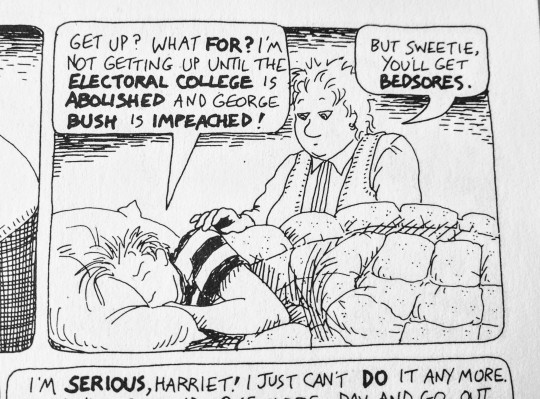Text
guy sitting in front of me in class was vandalizing wikipedia and i kept reverting his edits as soon as he made them and he couldn't figure out why it was happening
138K notes
·
View notes
Text
Maybe a hot take on radblr but i do not support any of trump’s actions regarding transgender people - such as legally defining only two genders, transferring trans identified males to men’s prisons, revoking rights/protections in the military etc. I absolutely want female safety to supersede male feelings but I don’t want it this way. trump (lowercase, derogatory) is straight up evil. He is one executive order away from dictatorship. This is not radical feminism, this is conservatism. In this case I don’t think the end justifies the means. I want protections for the female sex enacted by those with women’s safety in mind, not by a corrupt hateful fascist who doesn’t see women as people
396 notes
·
View notes
Text
I saw someone on tiktok say their bush was painful??? I was so confused??? it is so comfortable in fact the most comfortable thing ever
some women have literally never gone even 6 months w/o shaving their pubic hair post-puberty IN THEIR WHOLE ENTIRE LIVES. isn't that tragic??? and then they pretend that they know what it's like to have pubic hair at a comfortable length. the cozyness of pubic hair and not having to shave all the fucking time and deal with prickly hair and all the mess all the time....... it's such a good texture too. it adds so many sensations to sex and it's even just stimmy non-sexually and it looks SO CUTE!!!!!!!!!!! like holy shit. a little furball that you can pet
and i do. i do pet her. my bush is everything to me <3 teehee
24 notes
·
View notes
Text
the only one who has ever seemed to care about my makeupless existence is my mom
you can leave the house with a bare face and suffer no consequences btw. if you're a woman you do not have to wear any makeup
14K notes
·
View notes
Text
you can leave the house with a bare face and suffer no consequences btw. if you're a woman you do not have to wear any makeup
14K notes
·
View notes
Photo

as a usamerican its actually crazy to look at old election maps and see how every state was a swing state at one point apparently. no way cali or the west of the northeast would ever turn red these days but even when the map looked like this the popular vote was pretty close

do you ever just suddenly feel the weight of more years of exhaustion than you’ve been alive
56K notes
·
View notes
Text
every time someone gets married and changes her name an angel loses her wings
0 notes
Text
I will die on this hill but we need to stop classifying arts and literature and philosophy as soft and feminine and therefore insignificant compared to science and math. Because they are not. They are just as important as STEM are. Even women in stem downplay the greatness and significance of humanities/languages/philosophy/etc and it hurts. It hurts to see women joining the system of hating women, categorising things as feminine and connect femininity with unimportance. You are not better than anyone for choosing stem major. I’m so sick of this. (My class is for students who major in stem and our gender ratio is not looking good yet girls make fun of humanities and other non stem majors. It hurts to see how much internalised misogyny they hold and think that they would be taken seriously only if they majored in male dominated fields. No matter how much they try to kiss the oppressor’ ass, they’d never seen as good enough and we need to stop fighting with our own people.)
53 notes
·
View notes
Text
I could've been that young girl being mutilated had I been born on a different continent, I could've been that young woman being burnt alive had I been born a little earlier, I could've been that child bride. I don't think we truly realise how astronomically close we came to being subjected to such atrocities and avoided them only by chance, but for some of us these practices are a reality, some of us have gone through all the horrors we can think of for no other reason than their biology and their misfortune. (and of course we might not be excused of them for the remaining rest of our lives, safety is not guaranteed no matter where you live) I never want to hear somebody say that feminism is no longer needed.
843 notes
·
View notes











